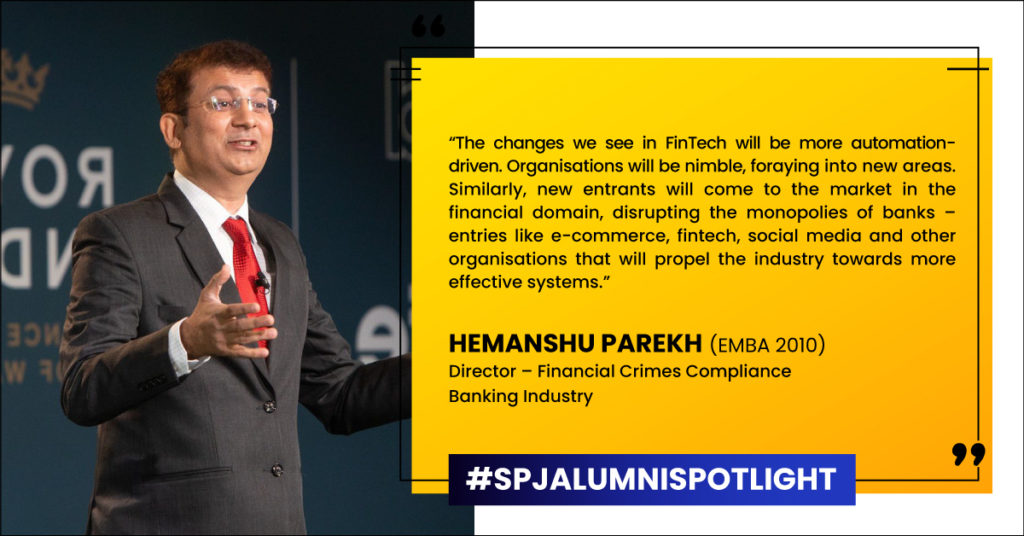UNDERSTANDING THE WORLD OF FINANCIAL CRIMES AND COMPLIANCE – SPJ ALUMNI SPOTLIGHT WITH HEMANSHU PAREKH
Lawyer, MBA, CA, financial crimes investigator, actor, playwright, coach, motivational speaker, soldier, history enthusiast – there are barely any hats that Hemanshu Parekh (EMBA 2010) doesn’t wear. Someone who has probably achieved it all, Hemanshu even holds Singapore’s national record for walking the entire circumference of the country in 4.5 days.
A leader in financial crimes investigations, Hemanshu is currently the Director of Financial Crimes Compliance at a Multinational Bank. To understand the latest industry trends and explore its future, we caught up with him for a quick interview.

Your profile is truly inspiring. Could you tell us a bit about your personal and professional journey?
Thank you, I’m honoured! You asked me about my personal and professional journey, but I would also like to add my social journey. These three might look different, but they have all come together to make one fantastic expedition for me. I see everything as connected and related and have lived through my experiences passionately.
I am a Chartered Accountant from Mumbai. Before moving to Singapore sixteen years ago, I also completed my law degree from Government Law College, Mumbai. In Singapore, I pursued my MBA from SP Jain Global and worked in banking, predominantly in financial crimes investigations. Throughout my professional career, I have taken up different roles across industries like insurance, advertising, telecommunications and banking
How did your qualifications – EMBA, LLB, CA, and CAMS – assist you in achieving your career goals?
Qualifications are very helpful in getting you where you want to get. You may have potential insight and pathway, but a suitable degree provides a measuring barometer for prospective employers worldwide. Beyond the final certificate, your education’s most crucial role is developing your thought process.
Each qualification I gained in my life gave me different qualities. Chartered Accountancy made me a man of detail, amenable to changes and understanding the ramifications of my actions. LLB made me astute, standing steadfast for what I believe. CAMS gave me the skills to become an expert investigator. MBA made me a pragmatic, practical, quick, business-oriented decision-maker.
In short, my LLB taught me how to change things I don’t accept, the CA taught me how to accept things I can’t change, and my MBA taught me how to differentiate between the two.
What changes have you seen in the digital space over your years at a global multinational bank? What significant changes/trends can we expect in the next few years?
Over time, digitisation and technology have become increasingly important in our lives. Naturally, this has also come to banking in a big way. Fintech companies are now mediating between banks and customers, making both banks’ and customers’ lives easy. Big brands like Apple, Google, Facebook, and Amazon, are taking more and more interest in the financial domain, which was hitherto reserved for financial institutions. So, it’s an exciting time to be in this industry, and this also keeps the banks on their toes.
The changes we see will be more technology and automation driven. Organisations will be nimble, foraying into new areas. Similarly, new entrants will come to the market in the financial domain, disrupting the monopolies of banks – entries like e-commerce, fintech, social media and other organisations that will propel the industry towards more effective systems.
How did data analytics assist you in AML and financial crimes investigations?
At the basic level, MS Excel has been my most handy tool. I use Excel extensively to analyse and conduct data analytics on various factors, parameters and financial investigations. We use Statistical Models for specialised data analytics. Automated transition tools generates alerts based on pre determind rules and parameters. These have helped banks work out the financial crimes space for over two decades.
However, the success ratio of these rule based transaction monitoring tools tend to be pretty low. This is why Data Analytics in terms of Machine Learning Models is the cutting-edge technology of the future. Once you target a crime and develop a model around it, the model studies patterns and teaches itself to predict criminals among your customers. It could be even before the criminal acts.
To what extent, in your opinion, have the loopholes for financial crimes been reduced over the years?
There’s a saying in Gujarat that roughly translates to ‘If you fix 12 problems, the 13th problem will be generated.’ This is entirely applicable to financial crime loopholes as well. It’s never going to be completely loophole-free.
We must give some credit to the criminals as well. They are intelligent people and find loopholes with a mission, while the rest of us solve them in our 9 to 5 jobs. Unfortunately, this means that criminals are usually a couple of steps ahead. While banks and other organisations keep developing robust technologies to safeguard customers, criminals keep devising new methods at the most basic level to exploit the weakest link. And more often than not, the weakest link is the customer themself. So, no matter how strong the financial organisations, websites and systems are, none are effective if the criminal convinces the customer to reveal sensitive account information firsthand.
With your hectic work schedule, how do you find the time for volunteering and personal interests like the theatre? What helps keep your passion alive?
I grew up listening to the stories of India’s freedom struggle. I wanted to be one of the freedom fighters, but India was already free by then (thankfully!). So, what was the next best thing I could do? Giving back to society of course! It may sound cliché, but that has been my driving force. When I am conducting an investigation, I am basically going after the criminal and when I am doing theatre, I spread good virtues and in doing both, I am trying my best to make the world a better place.
Additionally, each of the things I do is an equally essential and passionate part of my life. Each activity acts as fuel for the other. For example, if I have drama rehearsals scheduled for the evenings, I spend my day looking forward to that experience rather than going home and crashing. The excitement for drama takes away the tiredness built up during the day. Similarly, I can apply the learnings from my theatre workshops to my leadership role at work. Eventually, everything falls into place.
I would also like to share a memorable anecdote about this. When I started directing plays for the theatre, I usually only worked on projects starring adults. Later on, when I led the first project starring children, the rehearsals were such a mess that I wanted to give up immediately! Why would someone voluntarily take on so much stress, I asked myself. However, something tremendous happened when I saw these kids perform on stage on the D- day. Seeing them on stage made me realise something¾ my idea of bringing in a transformation would be the most successful with these kids.
After seeing them on stage, several parents spoke to me about how amazed there were by their kids’ performances. I remember this one grandmother who was so thankful to have her grandkid connected to her culture. She told me, “I now have a common language to converse with my grandson. Earlier, he would only speak in English, and I don’t know English. But now, because of this play, he is interested in the Gujarati language again.”
I even had a mother tell me how her child used to have speech difficulty that wasn’t improving with several different therapies. But the confidence he gained through this play by making new friends during rehearsals¾ boosted his self-esteem.
How can you not continue working on this passion when you receive this kind of feedback? The drama, in the end, is just a by-product. The main result is the lives we are touching and transforming along the way.
Did your journey at SP Jain help you become who you are today? What are the most unforgettable memories that you created at the campus?
I primarily joined SP Jain because I’m from Mumbai and SP Jain has a massive reputation in Mumbai. I knew what standards to expect from my education at this institute, and I enjoyed every moment I spent here. I made a lot of friends who I am still in touch with. We even have a WhatsApp group with 255 members, and we meet regularly, share ideas, and help each other out when needed.
Although the classes were very hectic and demanding, we absolutely enjoyed the experience. Prof Venky (International Business), Prof Mankad (Economics) and Prof K Mehta (Financial Management) were my favourites. I would love to attend their lectures more if I could.
Do you have any advice for students and professionals who want to build a remarkable career like yours?
My advice to everyone is just to live life king-size. Whatever you want to do, do it passionately. Instead of just doing something for monetary rewards, do it because you love it. Once you have that attitude and strive for your passion and excellence, success will follow.
Want to learn how SPJ alumni are making a difference around the globe? Check out the stories from our top alumni here.
Related Posts
-
 In This World of Internationalisation, Will You Survive?
No Comments | Jul 27, 2011
In This World of Internationalisation, Will You Survive?
No Comments | Jul 27, 2011 -
 Key to great interviewing
No Comments | Aug 19, 2011
Key to great interviewing
No Comments | Aug 19, 2011 -
 The Perks of Having a Global Network
No Comments | Oct 30, 2014
The Perks of Having a Global Network
No Comments | Oct 30, 2014 -
 SP Jain President among top Indian business leaders to accompany Indian PM to Australia
No Comments | Nov 26, 2014
SP Jain President among top Indian business leaders to accompany Indian PM to Australia
No Comments | Nov 26, 2014
